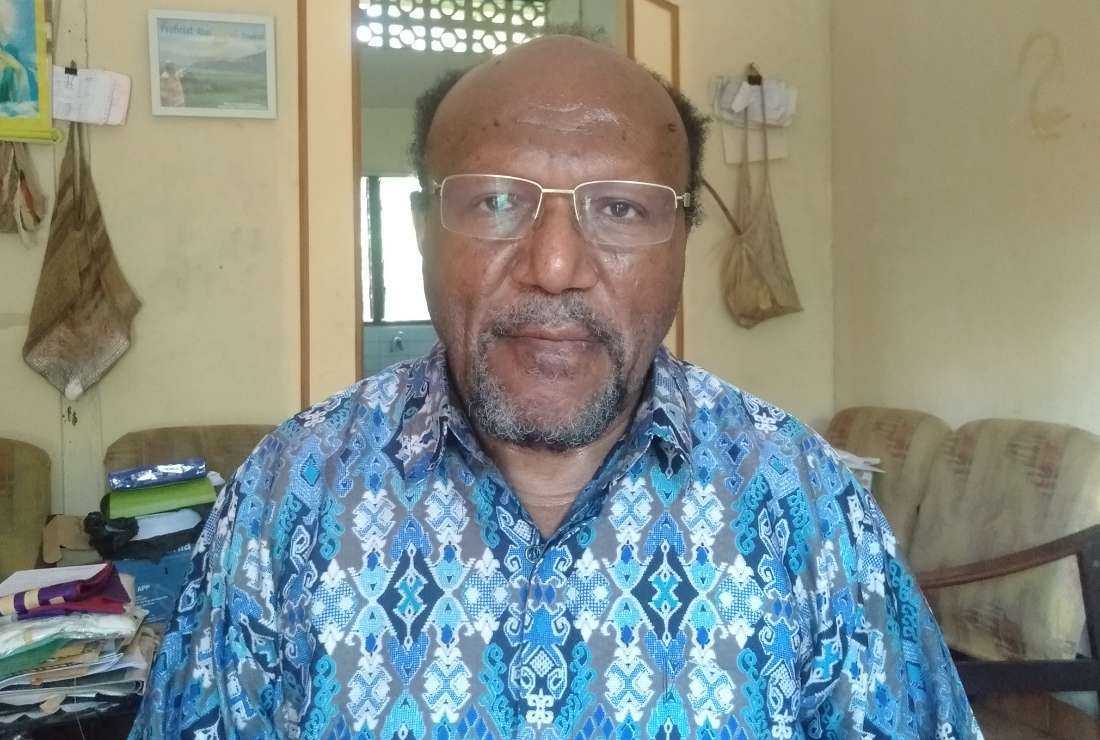
They want an end to military operations in the crisis-hit province following the move to implement a 'combat alert operation'

Bishop Yanuarius Theofilus Matopai You of Jayapura said at a press conference on April 26 that "we don't want many civilian casualties."(Photo supplied)
In a rare gesture, Catholic and Protestant leaders in Papua have come together to appeal to Indonesian President Joko Widodo to stop military operations in the crisis-hit province following the latest move to implement a 'combat alert operation.'
Bishop Yanuarius Theofilus Matopai You of Jayapura said, "We don't want any civilian casualties."
"Therefore, we respectfully ask the President of the Republic of Indonesia to withdraw troops and take steps for negotiations and a humanitarian approach," Bishop You said at a press conference on April 26 along with other Christian leaders.
This is the first time the Catholic Church has joined hands with Protestant leaders against the military build-up in Papua which intensified in recent months.
You, 72, who was installed bishop in February, was accompanied by Reverend Dorman Wandikbo, president of the Evangelical Church in Indonesia, Reverend Socratez Sofyan Yoman, president of the Communion of Baptist Churches of West Papua, Reverend Tilas Mom, chairperson of the Kingmi Synod in the Land of Papua, Reverend Andrikus Mofu, chairperson of the Synod of the Indonesian Christian Church in the Land of Papua, and Reverend Benny Giay, moderator of the Papua Church Council.
Their call came in response to the military's move last week to beef up combat operations in the region following the killings of five soldiers by the West Papua National Liberation Army (TPN-PB), which the Indonesian government has labeled as an armed criminal group.
The soldiers were killed during the efforts to free New Zealand pilot Phillip Mehrtens, who has been held hostage since February this year.
The term 'combat alert operation' allows soldiers to move around in combat weapons and open fire at anyone they suspect of being associated with terrorist activities, rights activists say.
On April 24, the TPN-PB released a video statement by Mehrtens in which the pilot accused the military of using a bomb in the Nduga Regency area.
The pilot asked the government to stop it as it endangered his life and that of civilians.
“When bombs are dropped," according to You, it will have tremendous consequences for humans and the environment.
Herman Taryaman, the military chief in Papua, however, has disputed the claim, and said, "The safety of the pilot and the public is paramount.”
A former Dutch colony, Papua declared itself independent in 1961, but neighboring Indonesia took control two years later, promising to have an independence referendum. The subsequent voting in favor of staying as part of Indonesia was widely considered a sham.
According to data from the advocacy group Imparsial, the number of soldiers in Papua is currently pegged at 16,900, most of them with combat qualifications.
At least 242 people were killed in the conflict in the past four years from 2018, including 177 civilians, says a report by the international rights group, Amnesty International.
The death toll includes 44 officers of the military and police and 21 rebels of pro-independence groups.
The standoff continues to trigger anxiety among local residents and Church leaders.
Florianus Geong, a resident in Nduga Regency, one of the worst affected areas in the region, said, "They [the army] patrol every day."
At the press conference, Reverend Wandikbo said the latest operation by the military would exacerbate the situation as people are struggling for basic services.
"Children can't go to school because the military uses schools and health centers (as their camps). They also use houses and churches," Wandikbo said.
Reverend Yoman asked the president to appoint a special envoy to negotiate with the rebels.
"The president should appoint a special envoy so that they can communicate" with rebels, he said.
Help us keep UCA News independent
The Church in Asia needs objective and independent journalism to speak the truth about the Church and the state.
With a network of professionally qualified journalists and editors across Asia, UCA News is just about meeting that need. But professionalism does not come cheap. We depend on you, our readers, to help maintain our independence and seek that truth.
A small donation of US$2 a month would make a big difference in our quest to achieve our goal.

Share your comments